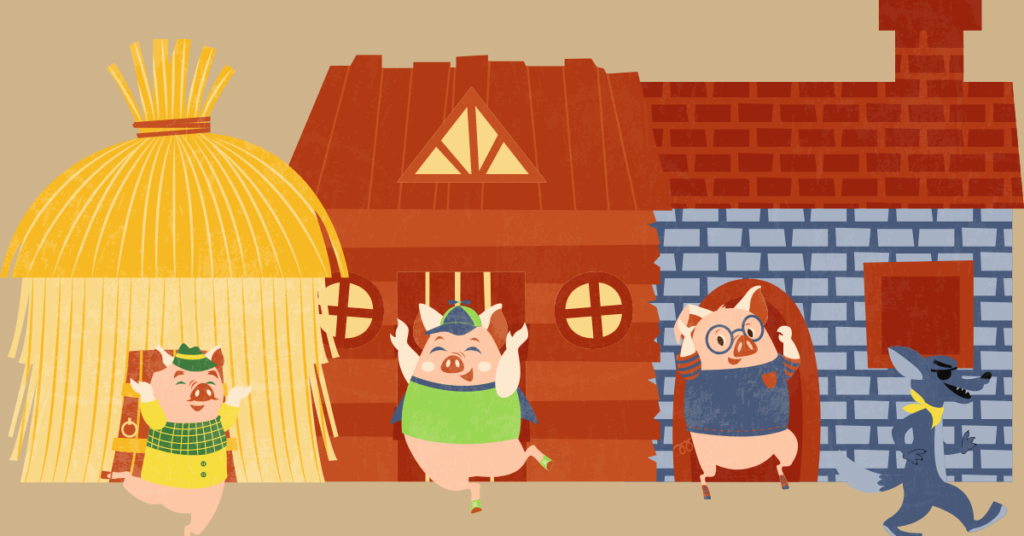
Exercise 1: Vocabulary
1. Diligent (adjective):
Definition: Showing careful and persistent effort or work.
Example: Oliver was diligent in building his house, working tirelessly to make it sturdy.
2. Foundation (noun):
Definition: The base or groundwork on which something is built or established.
Example: Benjamin understood that a strong foundation was essential for his house to withstand challenges.
3. Vulnerable (adjective):
Definition: Susceptible to harm, attack, or damage.
Example: Henry’s straw house was vulnerable to the wolf’s huffing and puffing.
4. Resilience (noun):
Definition: The ability to recover quickly from difficulties or adversity.
Example: The brick house’s resilience allowed it to withstand the wolf’s attempts to blow it down.
5. Concede (verb):
Definition: To admit that something is true or valid after first denying or resisting it.
Example: The wolf had to concede defeat when he couldn’t blow down Benjamin’s brick house.
6. Endeavor (noun):
Definition: A serious or earnest effort to accomplish something.
Example: The story encourages us to prioritize quality and resilience in our endeavors.
7. Foresee (verb):
Definition: To anticipate or predict something before it happens.
Example: Benjamin valued foresight and planning when constructing his house.
8. Shortcut (noun):
Definition: A quicker or more direct route or method to achieve a goal.
Example: Henry learned that seeking shortcuts in life could lead to vulnerability.
9. Adversity (noun):
Definition: Difficulties, misfortune, or hardship faced in life.
Example: The three little pigs learned the importance of preparation in the face of adversity.
10. Convenience (noun):
Definition: The state of being able to proceed with something with little effort or difficulty.
Example: Henry’s choice of building with straw was based on convenience, but it proved vulnerable.
Exercise 2: Story
Once upon a time, there were three little pigs who lived in a peaceful countryside. Each little pig had his own unique personality and approach to life. The first pig was named Henry, and he was known for his carefree nature and love for play. The second pig, Oliver, was diligent and hardworking, always seeking to build a stable and secure life. The third pig, Benjamin, was wise and practical, valuing foresight and planning.
One day, the three little pigs decided it was time to build homes of their own. Henry, looking for the quickest solution, built his house out of straw. Oliver, desiring a bit more security, opted for a house made of sticks. Benjamin, recognizing the importance of a strong foundation, invested his time and effort in constructing a sturdy house made of bricks.
As the days went by, a menacing wolf named Wolfgang became aware of the three little pigs and their newly built homes. The wolf, hungry and eager for a meal, set his sights on the vulnerable structures. He approached Henry’s straw house first, confident that it would crumble easily. With a mighty huff and puff, the wolf blew Henry’s house down, leaving him in shock and seeking refuge elsewhere.
Next, the wolf turned his attention to Oliver’s house made of sticks. He blew with all his might, and though the sticks provided some resistance, they eventually gave way, leaving Oliver defenseless against the wolf’s advances.
Finally, the wolf arrived at Benjamin’s house, constructed with solid bricks. The wolf huffed and puffed, but despite his strongest efforts, the house stood firm, protecting Benjamin inside. Frustrated and defeated, the wolf conceded and retreated into the forest.
Realizing the importance of their choices, Henry and Oliver sought refuge in Benjamin’s secure brick house. They realized that it was not enough to seek convenience or take shortcuts in life. Together, the three little pigs lived happily, secure in their well-built home.
The tale of the Three Little Pigs teaches us the significance of hard work, diligence, and the importance of a solid foundation. It reminds us that shortcuts and hasty decisions may leave us vulnerable to unforeseen challenges. By demonstrating the value of careful planning and determination, the story encourages us to prioritize quality and resilience in our endeavors.
And so, the three little pigs, having learned their lesson, lived happily ever after, secure in their strong and well-built home, forever mindful of the importance of dedication and preparation in the face of adversity.
Exercise 3: Questions
1. **What are the names of the three little pigs, and what were their primary characteristics?
2. What materials did each of the three little pigs use to build their houses, and what were the outcomes?
3. What important lesson does the story of “The Three Little Pigs” teach us?
4. What is the role of the wolf in the story, and how does his character contribute to the plot’s development?
5. How does the story conclude, and what is the final message or moral that it imparts to the readers?
Exercise 4: Discussion
- Who are the main characters?
- What is the moral of the story?
- Do you have a similar story in your culture? How is it the same? How is it different?
- What did you like or dislike about the story?